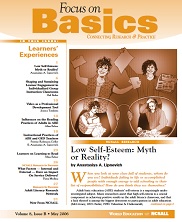"Do ask, they’ll tell” is a good way of describing much of the research shared in this issue of Focus on Basics. How do adult learners feel about themselves? What works for them in terms of reading instruction? What do they read outside of class? What keeps them engaged in class? Researchers from the NCSALL team at Rutgers University posed these questions, followed learners at home and in the community, and videotaped them in classrooms to learn more about the experiences of the learner and what implications those experiences have for educational practice.
Anastasiya A. Lipnevich looked for empirical data to confirm the assertion that adult basic education (ABE) students have low self-esteem. She found the opposite. Although it is only one small study, her results, in the cover article, should cause us to examine the image we may have of ABE learners and make us look for data whenever we hear a commonly held but perhaps unsubstantiated concept touted as truth.
Engagement is a precursor to learning, reasoned Hal Beder, who leads the NCSALL team at Rutgers, therefore understanding engagement will provide insight into instruction. Turn to page 6 for insights on the factors that shape engagement in classes that use individualized group instruction (learners working at their own pace on materials chosen for them). To gather data on engagement, the research team videotaped learners in classes and, together with teachers from those classes, reviewed the tapes. Jessica Tomkins asked the teachers what impact the videos had and learned that they provided the teachers with useful insight—about themselves. Her report on video as a professional development tool starts on page 10.
Curious about the reading and writing adult learners do outside of class, Alisa Belzer traveled with three adult learners as they went about their days. She shares her findings and the implications they have for teaching in the article on page 14.
Perrine Robinson-Geller and Anastasiya Lipnevich studied the types of instruction used by ABE teachers across the country. Their findings indicate that teachers are just as likely to mix instructional types as to stay with only one. Read the article on page 19 and identify your predominant type.
One source of information on effective reading instruction is the students who have been effective in learning. Alisa Belzer interviewed 15 such learners and shares their insights in the article that begins on page 23.
Seven other research studies on reading, all still in process, are described in the section that begins on page 27. A study on the factors that have an impact on service delivery is also in process; Patsy Medina describes that research on page 26.


